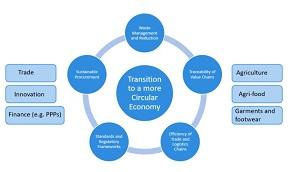A circular economy is a paradigm which can contribute to reducing the economic, environmental and social costs of resource use, while at the same time strengthening economic competitiveness, reducing poverty, and providing better quality of life, in line with the United Nations 2030 Agenda for Sustainable Development.
A circular economy transition can contribute to SDG 12 (“ensuring sustainable consumption and production”) by keeping resource use at or below regeneration levels, rethinking production and consumption processes to minimize waste and pollution and extending product lifecycles and broad sharing of assets.
Through a new three-year project, financed from the 13th tranche of the UN Development Account, UNECE, together with partners within and beyond the UN system, will support selected transition countries in accelerating the shift towards a more circular economy.
“In the journey towards sustainable economic recovery, no one should be left behind. This project will help bring forward the voices of transition economies on issues related to circularity and sustainability” stressed Ms. Olga Algayerova, UNECE Executive Secretary.
As one key deliverable, the project will create a multi-stakeholder knowledge sharing network to develop and disseminate evidence-based good policy practices on circularity. Some of the good practices developed by this network will then be piloted in three UNECE programme countries.
“Sustainability including circular processes have become an integral part of Kazakhstan’s development strategy and are gaining attention also among other countries participating in the UN Special Programme for the Economies of Central Asia (SPECA). This project will help strengthen and concretize existing sustainability programs in Kazakhstan”, said Mr. Olzhas Sartayev, CEO of Special Economic Zone "Park of Innovative Technologies" in Almaty, Kazakhstan.
Ms. Aleksandra Vucinic, Head of Group for Circular and Green Economy, Ministry of Environmental Protection, Republic of Serbia stressed that: “There is strong potential for advancing circularity in Serbia. We have come a long way as part of our process of aligning to EU rules, however, much remains to be done. We are looking forward to working closely with the UNECE to accelerate our circular economy transition."
The circularity concept is gaining prominence in transition economies across various sectors, including waste management, agriculture, construction, transport, energy, agri-food and services. While the management and reduction of waste is an obvious entry point, circularity is increasingly seen as cutting across many other sectors of economic activities. This was evidenced by representatives of Georgia, Kazakhstan and the Republic of Serbia at a recent entitled “Promoting Circularity in Transition Economies: The Role of Trade and Economic Cooperation”.
By highlighting the contribution of trade to the shift to circularity, the project recognises topical developments, including at the WTO’s Committee on Trade and Environment and also within the context of the SPECA Working Group on Trade and its Principles of Sustainable Trade. Using UNECE’s vast range of normative instruments in areas such as supply chain traceability, innovation enhancing, sustainable procurement or waste-to-energy, the project aims to help countries be at the forefront of this new policy challenge.
The circular economy and the sustainable use of natural resources in the region will be the theme of the 69th Session of the Commission, UNECE’s highest governing body. This is a clear sign that member States recognize the circular economy as a priority issue they wish to work on in the years to come.
The Commission Session, scheduled for 20-21 April 2021, will chart the way forward on a strategic dimension by looking at the normative and governance gaps that should be closed to facilitate the shift to a more circular economy and how these could be addressed through UNECE work in its different areas of expertise.


